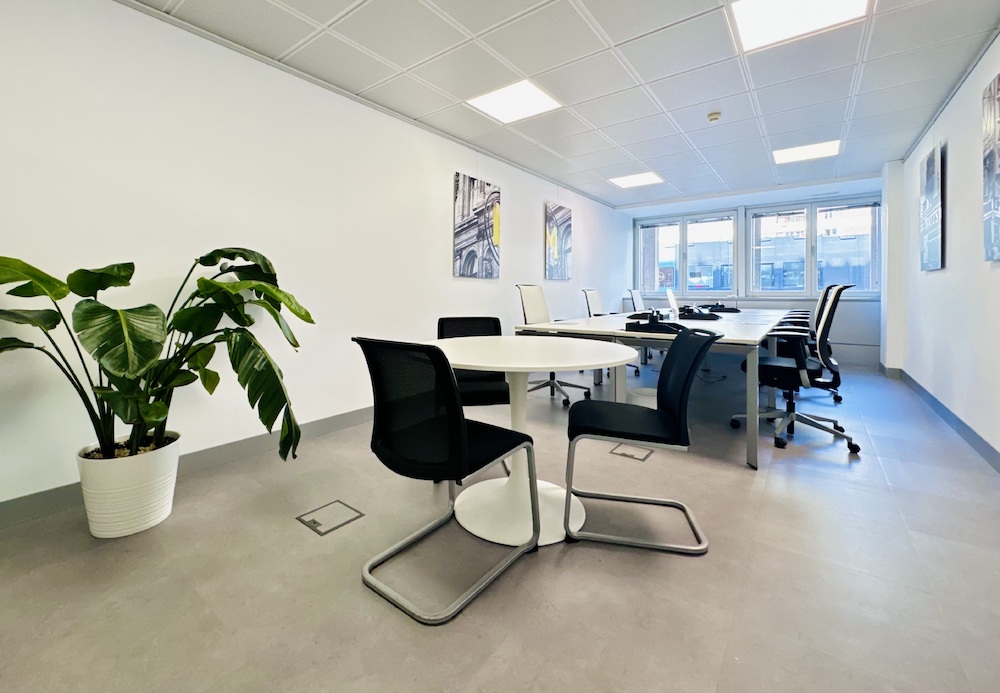The COVID-19 pandemic has marked a turning point in the way we understand work. The traditional office model, in which employees went to a fixed physical space on a daily basis, has been radically transformed. Within a few months, companies around the world were forced to implement telework on a massive scale, and although it was initially a temporary measure, many discovered that working from home had real advantages for both the company and the employee. This shift accelerated the adoption of a model that was already gaining popularity: hybrid work.
Hybrid working combines the best of both worlds: it allows employees to divide their time between office and remote work. Instead of having to choose between one or the other, it offers flexibility, which is highly valued today. This allows workers to better organise themselves, balancing their personal and professional lives, while companies benefit from increased productivity and operational cost savings.
The rise of hybrid working has been unstoppable. Companies of all sizes and sectors have started to adapt their working policies, and many have reduced or even eliminated their permanent offices, opting for more flexible solutions, such as shared offices or coworking spaces. According to several studies, this trend is not only here to stay but is expected to continue to grow in the coming years.
For businesses and workers, understanding the impact of hybrid work is key. Companies must adapt to this new reality by rethinking their workspaces and management models, while employees are increasingly looking for flexibility and an environment that allows them to be productive from anywhere. This change is not only transforming the way we work, but also how we interact with office spaces and what we demand from them.

The evolution of workspaces
For decades, the traditional office model has been the mainstay of the working day. Companies rented or bought large offices where employees came daily to work a rigid schedule. This system, based on continuous physical presence, responded to a need for direct supervision and the lack of technologies that would allow another type of organisation. However, over time, technological development has made this model obsolete for many companies and sectors.
Digitalisation has been one of the main drivers of change. Tools such as video calls, cloud-based collaborative working platforms and project management systems have meant that work is no longer tied to a specific physical location. Today, employees can communicate and work efficiently as a team from anywhere in the world. This transformation has opened the door to new ways of organising work, where flexibility is key.
Flexible working, which has gained prominence with the implementation of the hybrid model, is based on the idea that the employee does not need to be present in an office all the time to be productive. This change of mentality has profoundly altered the structure of workspaces. Companies have started to opt for smaller offices, designed to accommodate rotating teams and to meet specific needs, such as meetings or one-off projects.
In this context, coworking spaces have become very important. These shared environments allow professionals from different sectors to work in the same place, taking advantage of the flexibility of being able to reserve an office or meeting room only when needed.
They also offer a cost-effective solution for companies that are unwilling or unable to maintain fixed offices, but still need physical space at specific times. The versatility of coworking allows companies to adapt to the changing demands of their teams without committing large investments in infrastructure.
In short, the workspace has gone from being a fixed place to something dynamic and adaptable, responding to the needs of the moment. Flexible environments, such as those offered by business and coworking centres, not only optimise the use of resources, but also encourage collaboration between companies and professionals, creating a network of contacts and opportunities that, in the traditional model, would have been more difficult to achieve.
Changing demand for workspaces
In recent years, the way companies manage their office space has changed dramatically. The need for permanent, large, 100% team-occupied offices has decreased considerably. This is partly due to the adoption of hybrid and remote working models, which have proven to be as effective as face-to-face working. In addition, many companies have realised that maintaining fixed offices with high operational costs is not always the most efficient option.
With this transformation, we have seen a significant increase in demand for shared and flexible workspaces, such as coworking and business centres. These spaces offer the possibility to rent offices or rooms by the hour, day or week, without the obligation to sign long-term contracts. This flexibility allows companies to quickly adapt to fluctuations in their staffing and space requirements, adjusting the size of their facilities according to the volume of work or the number of employees who need to be physically in the office.
In addition, shared workspaces offer an important advantage: companies can access modern, fully equipped facilities without making a significant upfront investment. This includes everything from furniture and advanced technology to services such as cleaning, reception, security and maintenance. These are key factors for companies looking to reduce costs without sacrificing the quality and comfort of their working environment.
Companies, especially small and medium-sized enterprises, startups and entrepreneurs, are adopting much more customised and efficient solutions. Instead of renting large, empty offices most of the time, they are opting to hire space that can be tailored to their immediate needs. For example, a company that only needs a meeting room once a week does not have to commit to renting an office for the whole month. This not only optimises resources, but also avoids unnecessary expenditure.
This trend towards greater personalisation and efficiency also translates into improved employee productivity and motivation. Being able to work in spaces that suit their specific needs, whether to collaborate with a team or to focus on individual tasks, creates a more satisfying and dynamic working environment.
In brief, the demand for permanent offices has given way to a more flexible and efficient model, where companies are looking for tailor-made solutions that allow them to optimise their costs and offer their employees environments adapted to the new realities of work. Spaces such as business and coworking centres are the ideal response to this new demand, offering versatility, technology and comprehensive services that allow companies to focus on what is really important: their growth and development.

Discovering the benefits of hybrid work
Hybrid working has not only changed the way people work, but has proven to be a strategy with multiple advantages for companies. One of the most obvious benefits is the reduction in operating costs. By not having to maintain large offices occupied full time, many companies have been able to reduce significant expenses on rent, supplies, cleaning, security and maintenance. This is especially a relief for small and medium-sized companies, which can now allocate these resources to other, more strategic areas of their business.
The greater flexibility offered by hybrid working also allows companies to better adapt to fluctuations in workloads. It is no longer necessary to have the same number of employees in the office every day, making it easier to manage projects on an ad hoc basis. Companies can distribute their teams more efficiently, organising rotations or allowing certain employees to work from home when their physical presence is not required. This flexibility not only optimises office space, but also improves responsiveness to peak workloads or one-off projects.
Another key aspect is attracting and retaining talent. In an increasingly competitive labour market, flexible working policies have become a determining factor for employees. Many professionals value the ability to organise their working day more autonomously, allowing them to better balance their personal and professional lives. Companies that offer hybrid models not only have an easier time attracting talent, but also manage to retain their employees, as they feel more valued and satisfied in their work environment.
Hybrid working also encourages greater customisation and efficiency in the way companies manage their space and resources. By not relying on fixed offices, businesses can opt for bespoke solutions, such as renting meeting rooms or offices only when needed. This allows for planning that is more in line with the real needs of each team, avoiding spending on under-utilised resources.
In essence, hybrid work not only brings economic advantages, but also promotes a more agile and flexible business culture, adapted to the new realities of the labour market. Companies that have adopted this model have gained in efficiency, improved employee satisfaction and have managed to position themselves more competitively in an increasingly dynamic environment.
How have office spaces adapted to the post-pandemic reality?
With the implementation of hybrid working, office spaces have had to adapt to new needs and ways of working. Gone is the model of large offices filled with employees every day, and in its place have come smaller, more flexible offices designed for rotating teams. This new format allows employees to come to the office when they need to, without empty desks or under-utilised space. Companies are now opting for more compact offices, designed to accommodate only those who really need to be present at any given time, which reduces costs and optimises the use of space.
In addition, priority is given to spaces adapted for one-off meetings and collaborative work. Instead of an office dedicated exclusively to individual work, the new spaces are geared towards facilitating interaction when teams meet in person. Modular meeting rooms, open spaces for brainstorming or common areas designed to foster collaboration between employees have become essential.
These environments allow workers to make the most of the time they spend in the office, focusing on tasks that require direct interaction, while activities that can be performed remotely are still done from home or elsewhere.
The integration of advanced technology is another key aspect of this transformation. Hybrid offices are equipped with technological tools that enable seamless connectivity between employees who are working in the office and those who are remote. High-quality video conferencing systems, interactive whiteboards, high-speed Wi-Fi networks and collaborative management applications are now essential to ensure that the transition between face-to-face and remote work is as natural and efficient as possible.
In addition, technology not only facilitates communication, but also improves space management. Many offices have automatic booking systems for meeting rooms, allowing teams to manage their time more efficiently.
In addition, access control solutions with swipe cards and security cameras improve both security and flexibility, allowing employees to access the premises whenever they need to, without the need for reception staff at all times.
In short, office spaces are evolving towards a much more flexible and technologically advanced model, adapted to the reality of hybrid work. Offices are no longer just a place for daily work, but a space designed to facilitate collaboration, creativity and connection between teams, with more efficient management of resources and full integration of technology in their day-to-day work.
The role of workplaces in hybrid work
At Ibercenter, we are fully aware that hybrid working has changed the way companies operate and manage their workspaces. That’s why we have adapted our solutions to offer maximum flexibility, with options ranging from coworking spaces to customisable private offices.
We know that every company has different needs, so we offer a wide range of configurations so that you can choose the space that best suits the way you work. Whether you need an office for a day, a meeting room for an important presentation, or a private office for a team for an extended period, at Ibercenter we offer the flexibility needed for every business to find their ideal solution.
One of the aspects most valued by our clients is the access to services and amenities with no initial investment. Instead of having to assume the high costs of setting up an office from scratch, at Ibercenter companies find everything they need from day one: fully equipped offices, reception, cleaning, maintenance and security services.
We take care of all those details so that our clients can concentrate exclusively on growing their business. In addition, we offer access to our facilities 24 hours a day, every day of the year, ensuring total flexibility in the use of the space.
In this new working reality, where adaptability and efficiency are essential, Ibercenter has become a strategic ally for companies. Our more than 25 years of experience in the sector have allowed us to develop a deep understanding of our clients’ needs, which has led us to create spaces that promote both productivity and collaboration. In addition, we offer shared environments that facilitate networking between professionals, opening the door to new business opportunities without the need to move from the workplace.
At Ibercenter, we are convinced that the future of work lies in flexibility. That is why our solutions are designed to offer companies the agility they need in a constantly changing work environment. Whatever the size or nature of your business, at our Azca, Gran Vía or Velázquez centres you will find the perfect space to adapt to the new demands of the market, without compromising your image or renouncing the quality services that guarantee your success.
Conclusion
In recent years, we have witnessed major changes in workspaces, driven mainly by the expansion of hybrid working. This model has redefined the need for permanent offices and has led to an increased demand for flexible and shared spaces, adapted to new ways of working. Companies are no longer looking for large offices for the whole team, but smaller, modular environments that allow employees to move freely between remote and face-to-face work.
Hybrid work continues to transform office spaces around the world, and Madrid is no exception. At Ibercenter, we have seen large corporations, startups and SMEs increasingly opt for flexible solutions that allow them to rent offices in Madrid without making long-term commitments and with the ability to adapt to their changing needs.
Moreover, in a context where one-off meetings or business events are essential to maintain team cohesion and make presentations to clients, the demand for meeting room hire in Madrid has also grown considerably.
At Ibercenter, we offer fully equipped meeting and training rooms, which allow companies to enjoy a professional environment without the need to maintain these spaces on a permanent basis. This flexibility is crucial in the new reality of the workplace, where face-to-face meetings are punctual, but are still vital for the smooth running of business.
Looking to the future, it is clear that flexible working and coworking spaces will continue to be central to the evolution of work environments. More and more companies are opting to downsize their physical offices, favouring the mobility and agility that this new model provides. At Ibercenter, we are ready to accompany our clients in this transformation, offering tailor-made solutions that adapt to their needs, either with flexible private offices or with the rental of specific spaces for meetings and events.
Hybrid working is here to stay, and at Ibercenter we continue to lead this change in Madrid, offering quality services that allow companies to focus on their growth while we take care of the rest.






